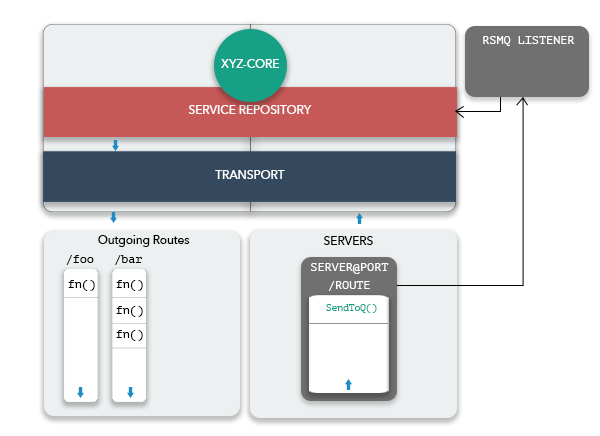xyz.rsmq.single.bootstrap
v0.4.2
Published
simple message queue bootstrap for xyz
Downloads
5
Readme
xyz.rsmq.single.bootstrap
Redis Simple Message Queue bootstrap function for xyz
Description
This module integrates xyz-core with RSMQ. It can be used for asynchronous messaging. It is highly flexible and can be added to any server in xyz. The beauty if this module is that the sender does not need to know about the receiver at all and works just as if it was sending a normal message. Let's see the big picture.

The main operations of this bootstrap function can be summarized as follows:
- A middleware will be injected into a server's listen route. This middleware will prevent the message to be delivered immediately to the service layer (usually by blocking
_httpMessageEvent). Instead it will send the message to a redis queue. - The redis queue component will listen for new messages and will invoke the service layer when a new message arrives.
Let's see the same information in xyz's logs. If you run worker.js in test folder, you see:
____________________ TRANSPORT LAYER ____________________
Transport:
outgoing middlewares:
call.dispatch.mw [/CALL] || _httpExport[0]
ping.dispatch.mw [/PING] || _httpExport[0]
HTTPServer @ 3000 ::
Middlewares:
call.receive.mw [/CALL] || _sendToRMSQueue[0]
ping.receive.mw [/PING] || _pingEvent[0]
UDPServer @ 3001 ::
Middlewares:
CALL_UDP.receive.mw [/CALL_UDP] || _sendToRMSQueue[0]
As you see, both CALL and CALL_UDP routes have been registered to send their messages to the queue using _sendToRMSQueue. We will discuss these tests in more depth in the following sections.
Usage
First of all, you need to have the module installed.
$ npm install xyz.rsmq.single.bootstrapand a redis server running
$ redis-serverImport the module and bootstrap your node with it.
var XYZ = require('xyz-core')
const _xyzRsmq = require('xyz.rsmq.single.bootstrap')
let worker = new XYZ({...})
// remove the default `httpEvent` middleware.
// note that it will work without this line since we call `end()` in `_sendToQueue`
worker.middlewares().transport.server('CALL')(worker.id().port).remove(0)
// bootstrap rsmq on HTTP server @ port 4000 and route 'call'
worker.bootstrap(_xyzRsmq, {
qnmae: 'http_queue',
serverId: {
port: worker.id().port,
route: 'CALL'
}
})
// you can access the rsmq object using:
const rsmq = _xyzRsmq._rsmq
// register a dummy task
worker.register('/task/cpu', (payload) => {
let num = 1
for (let i = 1; i < 100; i++) {
num = num * i
}
rsmq.size((err, size) => {
console.log(`/task/cpu done. remaining tasks in queuq: ${size}`)
})
})And that's about it! If you send a message to /task/cpu, you see that it will be called on schedule using a Queue
Obviously, since this is async messaging, there will be no
responsein the second argument of.register(). This line of code will respond to it.
Spec
xyz.rsmq.single.bootstrap returns a single function that can be used to bootstrap both udp and http routes and servers. See client.ms.js and client.udp.js in /test folder for more detail.
--
If the HTTP version is being used, the message will be responded to the caller with:
response.end(JSON.stringify({message: `message added to queue at receiver [${xyz.id().netId}]`}))--
Both the HTTP and UDP bootstrap functions can be configured using
ms.bootstrap(xyzRsmq, config)where config can be:
| option | default value | description |
|:-----------:|-----------------|-------------|
| config.rsmqConfig | see util/constants.js | options passed to rsmq worker. see this page |
| config.qname | xyz_rmsq | name of the queue |
| config.serverId.route | 5000 | name of the route in target server |
| config.serverId.port | xyz.id().port | port of the target server |
| config.mwIndex | 0 | index to insert sendToQueue() mw into |
Test and Example
The test folder includes a full test where one worker.js will receive and enqueue messages from one client.js using HTTP and one client.udp.js using UDP.
You can run each node individually or run them all using xyz-cli using
xyz dev -c ./xyztestrc.json